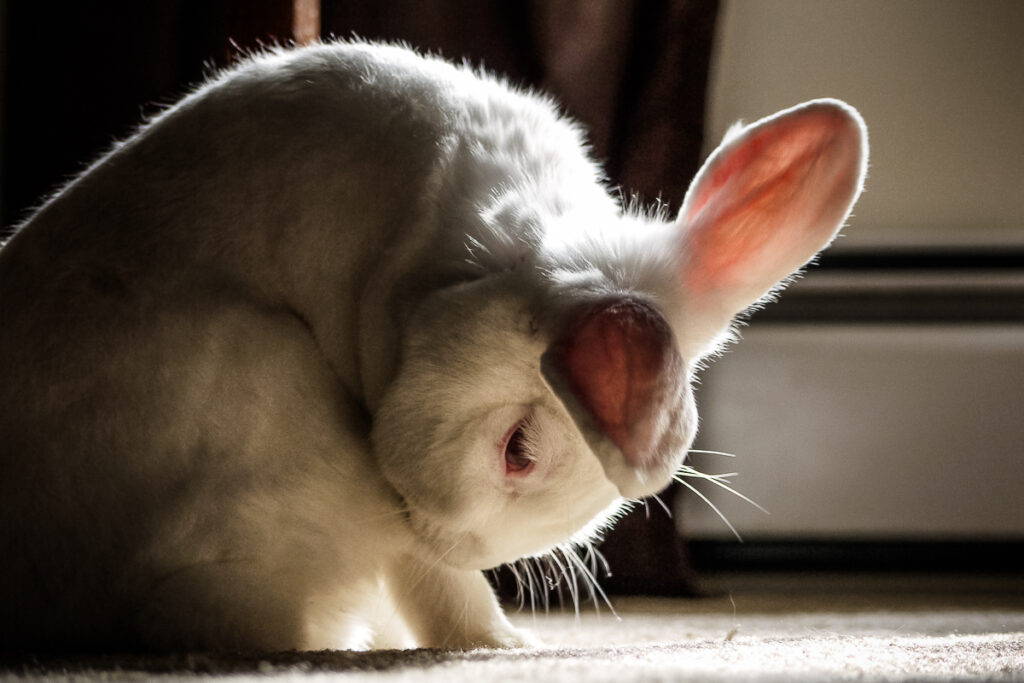As more pet caregivers seek holistic and alternative therapies for their furry companions, we are learning more about their benefits. While traditional veterinary care remains essential, many bunny caregivers are exploring complementary treatments to enhance their rabbits’ well-being. This article delves into several alternative therapies, including chiropractic care, Reiki, acupuncture, herbal medicine, massage therapy, and other common practices, offering insights into their potential benefits for rabbits.
- Acupuncture
- Tellington TTouch
- Chiropractic Care
- Massage Therapy
- Reiki
- Herbal Medicine
- Nutrition and Dietary Supplements
- Laser Therapy
Acupuncture for Rabbits
Acupuncture, a traditional Chinese medicine practice, involves inserting thin needles into specific points on the body to stimulate healing and pain relief. It’s increasingly used in veterinary medicine for various animals, including rabbits1 2.
Benefits:
- Pain Management: Acupuncture can be particularly effective for managing chronic pain, such as that caused by arthritis or dental issues.
- Improved Organ Function: Acupuncture stimulates specific points, enhancing the function of various organs and systems within the body.
- Support for Chronic Conditions: Rabbits with ongoing health issues, such as gastrointestinal stasis or respiratory problems, may benefit from regular acupuncture sessions.
Considerations:
- Professional Expertise: Always seek a certified veterinary acupuncturist to ensure the treatment is administered safely and correctly.
- Monitoring: Monitor your rabbit’s response to acupuncture, as some may show immediate improvement while others may need multiple sessions to see benefits.
Further Reading/Watching
- Teresa Bradley Bays, DVM, CVA, DABVP (ECM), CVMMP, CTPEP, Alternative Therapies to Treat Pain and Wound Healing in Rabbits
- Dr Jeffrey Ryan, DVM, Acupuncture in Rabbits. (Archived at The Wayback Machine.)
- Tara M. Harrison, and Sarah M. Churgin, Acupuncture and Traditional Chinese Veterinary Medicine in Zoological and Exotic Animal Medicine: A Review and Introduction of Methods. Veterinary Sciences. 2022 Feb; 9(2): 74.
- Huisheng Xie, DVM, MS, PhD and Christine Eckermann-Ross, DVM, CVA, CVCH, Introduction to Traditional Chinese Veterinary Medicine in Pediatric Exotic Animal Practice. Veterinary Clinics: Exotic Animals Practice May 2012, Volume 15Issue 2 p155-360
Tellington TTouch for Rabbits
Tellington TTouch is a gentle method of bodywork that helps improve behavior, performance, and health while reducing stress. It involves specific touches, lifts, and movements.
Benefits:
- Behavior Improvement: Helps reduce fear and anxiety, promoting more relaxed behavior.
- Healing: Can aid in the healing process and improve overall physical well-being.
Considerations:
- Training: Learn proper techniques from a certified TTouch practitioner to ensure it’s done correctly.
- Rabbit’s Comfort: Monitor the rabbit’s response to ensure it is comfortable with the touch.
Further Reading/Watching
- Dr Carolynn Harvey DVM, TTouch For Rabbits: A Gentle Way To Better Behavior And Health.
- by Marie Mead with Lauren McCall and Linda Tellington-Jones, PhD (Hon), Tellington TTouch for a Happy and Healthy Rabbit.
- Tellington TTouch® (Tellington TTouch Training™): www.ttouch.com
- TTouch Research and Studies.
Chiropractic Care for Rabbits
Chiropractic care focuses on diagnosing and treating musculoskeletal disorders, primarily through manual adjustment of the spine. For rabbits, chiropractic treatments can help with mobility issues, pain relief, and overall physical well-being.
Benefits:
- Improved Mobility: Rabbits with arthritis or other joint issues can experience improved movement and reduced pain through chiropractic adjustments.
- Pain Relief: Misalignments in the spine can cause significant discomfort. Chiropractic care aims to correct these issues, alleviating pain.
- Enhanced Nervous System Function: Proper spinal alignment can improve the functioning of the nervous system, potentially enhancing a rabbit’s overall health.
Considerations:
- Qualified Practitioners: It’s crucial to seek a chiropractor experienced with small animals, especially rabbits, to ensure safe and effective treatment.
- Vet Collaboration: Always consult with your rabbit-savvy vet before starting chiropractic care to ensure it’s appropriate for your pet’s specific condition.
Further Reading/Watching
- Teresa Bradley Bays, DVM, CVA, DABVP (ECM), CVMMP, CTPEP, Alternative Therapies to Treat Pain and Wound Healing in Rabbits
- University of Illinois at Urbana Champagne: Chiropractic Adjustment for Animals: Most Effective for Biomechanical Conditions. by Beth Mueller.
- International Veterinary Chiropractic Association (https://ivca.de/)
- American Veterinary Chiropractic Association (https://www.animalchiropractic.org/).
- Rabbit Story: Harry Goes to the Chiropractor by Dr. Marc L. Sommer and Kathy Nolan (archived at the Wayback Machine.)
Massage Therapy for Rabbits
Massage therapy for rabbits involves gentle manipulation of muscles and soft tissues to promote relaxation and relieve pain.
Benefits:
- Relaxation: Massage can help calm anxious rabbits and improve their overall sense of well-being.
- Pain Relief: It can benefit rabbits with musculoskeletal issues, relieving stiffness and discomfort.
- Improved Circulation: Massage can enhance blood flow, supporting overall health and aiding in injury recovery.
Considerations:
- Training: Learn proper techniques from a professional to avoid causing injury or stress to your rabbit.
- Rabbit Comfort: Ensure your rabbit is comfortable with the handling and adjust your technique based on their response.
Further Reading/Watching
- Disabled Rabbits.com: Massage for Disabled Rabbits
- Animal Wellness Guide: The Basic Bunny Massage Strokes
- Book: The Relaxed Rabbit. Massage for Your Pet Bunny.
- Stories: The bunny whisperer: Pet massage benefits rabbits, other animals. Milford Daily News.
Reiki for Rabbits
Reiki is a Japanese technique for stress reduction and relaxation that also promotes healing. It is based on the concept of life force energy and involves the practitioner placing their hands lightly on or near the animal to facilitate energy flow.
Benefits:
- Stress Reduction: Reiki can help calm nervous or anxious rabbits, promoting a sense of peace and relaxation.
- Healing Support: It can be a supportive therapy for rabbits recovering from illness or surgery by boosting their overall energy levels.
- Bonding: Reiki sessions can strengthen the bond between the caregiver and the rabbit through gentle touch and focused attention.
Considerations:
- Finding a Practitioner: Ensure the Reiki practitioner has experience working with animals, specifically rabbits.
- Comfort Level: Some rabbits may not be comfortable with hands-on therapies, so observe your pet’s reactions and discontinue if it causes stress.
Further Reading/Watching
- International Association of Reiki Professionals (IARP), Reiki for Pets.
- Book: Reiki for Animals
- Story: Energy Medicine Helps Rabbits with Fear and Limited Mobility
- Story: Reiki Spa Day for Wild Mama Rabbit
Herbal Medicine for Rabbits
Herbal medicine involves using plant-based remedies to support health and treat ailments. Common herbs for rabbits include chamomile for calming effects and echinacea for immune support. Some acupuncturists use a combination of acupuncture and traditional Chinese herbs synergistically.3
Benefits:
- Natural Remedies: Herbs can provide natural alternatives to pharmaceutical drugs, with fewer side effects.
- Immune Support: Herbs like echinacea can boost the immune system, helping rabbits resist infections.
- Calming Effects: Herbs such as chamomile can help soothe anxious or stressed rabbits.
Considerations:
- Safety: Always consult with a rabbit-savvy vet before administering any herbs, as some can be toxic to rabbits.
- Dosage: Proper dosing is crucial, and what works for other animals may not be suitable for rabbits.
Further Reading/Watching
- Teresa Bradley Bays, DVM, CVA, DABVP (ECM), CVMMP, CTPEP, Alternative Therapies to Treat Pain and Wound Healing in Rabbits
- Huisheng Xie, DVM, MS, PhD and Christine Eckermann-Ross, DVM, CVA, CVCH, Introduction to Traditional Chinese Veterinary Medicine in Pediatric Exotic Animal Practice. Veterinary Clinics: Exotic Animals Practice May 2012, Volume 15Issue 2 p155-360
- DisabledRabbits.com: Herbs for Rabbits
- Jobes: Growing Organic Herbs for Rabbits
- The BunnyLady.com: Healthy Herbs Your Rabbit Can Eat (and their medicinal properties)
- Shop: Small Pet Select’s Herbs and Herbal Blends for Rabbits
- Shop: NHV Natural Pet’s Rabbit Herbal Tincures
Laser Therapy For rabbits
Laser therapy, or low-level laser therapy (LLLT), uses light to stimulate cell regeneration and increase blood circulation. Laser therapy has also been shown to help as an antimicrobial.4 5 It can also help to reduce inflamation6.
Benefits:
- Pain Relief: Effective for pain management in conditions like arthritis or injuries.
- Healing: Promotes faster healing of wounds and reduction of inflammation.
Considerations:
- Professional Administration: Should be administered by a vet or trained professional to ensure the correct dosage and application.
- Monitoring: Regularly monitor the rabbit’s response to ensure the therapy is effective and not causing any adverse effects.
Further Reading/Watching
- American Animal Hospital Association: What Is Veterinary Laser Therapy?
Nutrition and Dietary Supplements for Rabbits
Certain supplements and specialized diets can support overall health and specific conditions in rabbits.
Benefits:
- Immune Support: Supplements like vitamin C and Echinacea can boost the immune system.
- Joint Health: Glucosamine and chondroitin supplements can help maintain joint health in older rabbits.
Considerations:
- Vet Approval: Always consult with a rabbit-savvy vet before introducing any supplements to ensure they are safe and beneficial for your rabbit.
- Quality Products: Use high-quality supplements specifically formulated for rabbits.
Further Reading/Watching
DisabledRabbit.com: Dietary Supplements
Integrating Alternative Therapies into Your Rabbit’s Care
When considering alternative therapies for your rabbit, it’s essential to take a thoughtful and informed approach. Here are some key steps to ensure your rabbit receives the best possible care:
- Consult with Your Vet: Always discuss any new treatments with a rabbit-savvy veterinarian to ensure they are appropriate for your rabbit’s specific health needs.
- Research Practitioners: Choose practitioners who are experienced in working with rabbits and have the necessary certifications and training.
- Monitor Your Rabbit’s Response: Pay close attention to how your rabbit responds to alternative therapies. While some rabbits may benefit greatly, others may not tolerate certain treatments well.
- Combine with Conventional Care: Use alternative therapies as complementary to conventional veterinary care, not as replacements. Regular check-ups and treatments prescribed by your vet are crucial for maintaining your rabbit’s health.
- Be Patient: Some alternative therapies may take time to show results. Be patient and allow sufficient time for the treatment to take effect.
Conclusion
Alternative therapies offer promising complementary options for enhancing the well-being of pet rabbits. Whether through chiropractic care, Reiki, acupuncture, herbal medicine, massage therapy, or herbal supplements, these treatments can provide additional support for managing pain, reducing stress, and promoting overall health. By integrating these therapies thoughtfully and in collaboration with veterinary care, rabbit caregivers can ensure their pets lead happier, healthier lives.
References
- Tara M. Harrison, and Sarah M. Churgin, Acupuncture and Traditional Chinese Veterinary Medicine in Zoological and Exotic Animal Medicine: A Review and Introduction of Methods. Veterinary Sciences. 2022 Feb; 9(2): 74. ↩︎
- Huisheng Xie, DVM, MS, PhD and Christine Eckermann-Ross, DVM, CVA, CVCH, Introduction to Traditional Chinese Veterinary Medicine in Pediatric Exotic Animal Practice. Veterinary Clinics: Exotic Animals Practice May 2012, Volume 15Issue 2 p155-360 ↩︎
- Huisheng Xie, DVM, MS, PhD and Christine Eckermann-Ross, DVM, CVA, CVCH, Introduction to Traditional Chinese Veterinary Medicine in Pediatric Exotic Animal Practice. Veterinary Clinics: Exotic Animals Practice May 2012, Volume 15Issue 2 p155-360 ↩︎
- Kouhkheil R. et al. The effect of combined pulsed wave low-level laser therapy and mesenchymal stem cell-conditioned medium on the healing of an infected wound with methicillin-resistant Staphylococcal aureus in diabetic rats. J Cell Biochem: 1-10, 2018 ↩︎
- Kaya GS. et al. The use of 808-nm light therapy to treat experimental chronic osteomyelitis induced in rats by methicillin-resistetant Staphylococcus aureus. Photomed Laser Surg, 29(6): 405-412, 2011.
↩︎ - Tabadaj J. et al. Effect of laser therapy on expression of angio- and fibrogenic factors, and cytokine concentrations during the healing process of human pressure ulcers. Int J Med Sci, 15(11): 1105-1112, 2013. ↩︎

